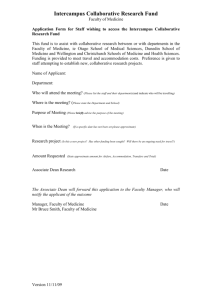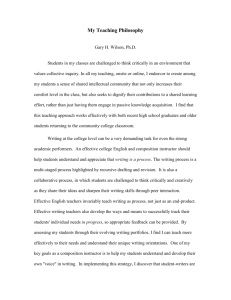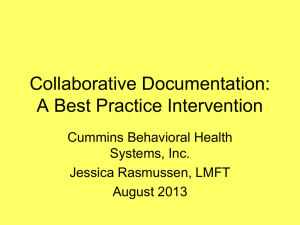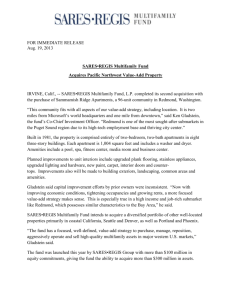Programme approval - Cardiff University
advertisement
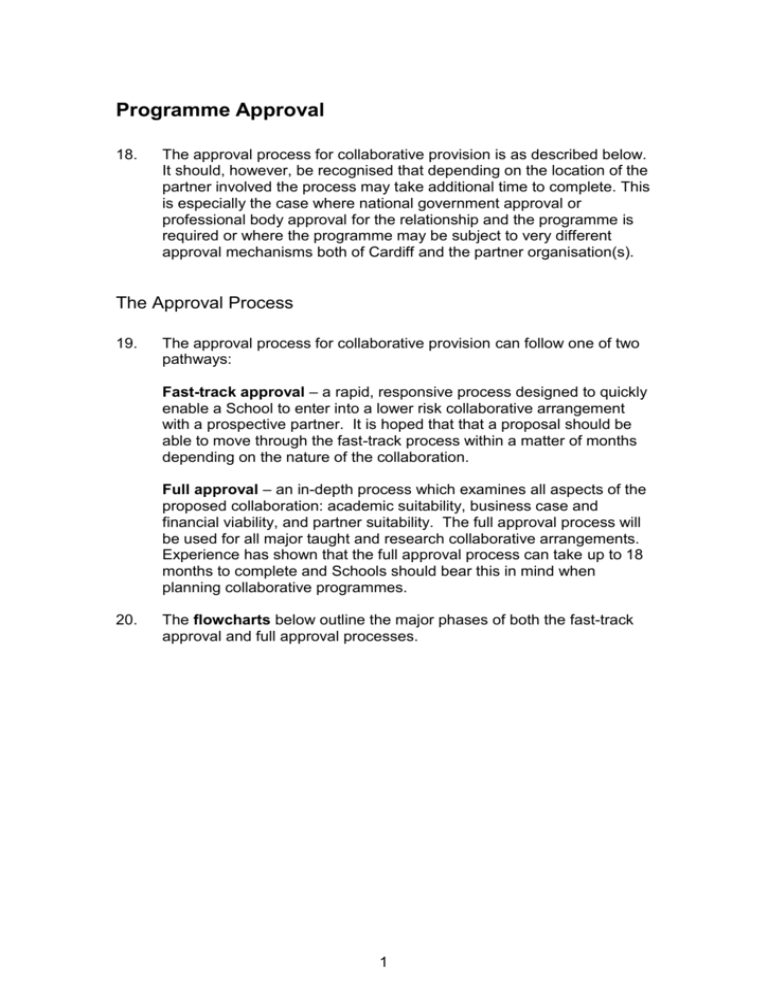
Programme Approval 18. The approval process for collaborative provision is as described below. It should, however, be recognised that depending on the location of the partner involved the process may take additional time to complete. This is especially the case where national government approval or professional body approval for the relationship and the programme is required or where the programme may be subject to very different approval mechanisms both of Cardiff and the partner organisation(s). The Approval Process 19. The approval process for collaborative provision can follow one of two pathways: Fast-track approval – a rapid, responsive process designed to quickly enable a School to enter into a lower risk collaborative arrangement with a prospective partner. It is hoped that that a proposal should be able to move through the fast-track process within a matter of months depending on the nature of the collaboration. Full approval – an in-depth process which examines all aspects of the proposed collaboration: academic suitability, business case and financial viability, and partner suitability. The full approval process will be used for all major taught and research collaborative arrangements. Experience has shown that the full approval process can take up to 18 months to complete and Schools should bear this in mind when planning collaborative programmes. 20. The flowcharts below outline the major phases of both the fast-track approval and full approval processes. 1 2 3 Who to Contact First 21. The first step when considering the development of collaborative provision is to contact the appropriate Head of School, School Director of Teaching and Learning and Chair of the Board of Studies. Once agreement to develop the idea has been given then proposers should contact Registry (REGIS) for further advice on developing the proposal further. The REGIS contact is: 22. Matthew Turner, Registry Officer (Quality Assurance and Enhancement) (ext 79215 Turner M1@cardiff.ac.uk) For collaborations involving an international partner proposers should also make contact with CAIRD: Rhian Curtis, Senior International Officer (ext 76596 CurtisR3@cardiff.ac.uk) The Initial Proposal 23. The first stage in the approval process is the completion of the initial concept form. The purpose of this form is to allow a Head of School to decide if in principle approval should be given to the proposal to allow and commit further development work to be undertaken. A template for the Initial Concept Form is included in Appendix 4. The initial concept form should be completed by the proposer of the collaboration with support from staff in REGIS, CAIRD and other directorates where relevant. 24. If the proposal also involves an application for funding from an external body then the application form and any associated documentation should also be completed alongside the proposal documents. This will be considered as part of the approval process. 25. The proposing School should ensure that they have fully consulted with all relevant Directorates and any professional body early in the process, and while the above documents are being written. The results of that consultation should be included in the Initial Concept Form. 26. The proposal should be discussed with the Head of the proposing School who, having considered the merits of the proposal, may refer it back for further development or ask that the proposal be withdrawn. If the Head of School feels that the proposal is fundamentally sound and in line with the School and University’s strategic plans they can approve the proposal in principle to allow further development work to take place. 4 At this stage, a letter of intent may be sent to the proposed partner detailing the common understanding of the aim of the proposal. A template for this is available from CAIRD or REGIS. 27. Once the Head of School has confirmed approval in principle, the proposal may proceed to the rest of the approval process. 28. The extent of the approval process will be determined through consideration of the risk assessment outcomes by CPSC, in consultation with REGIS. 29. The Collaborative Provision Sub-Committee (CPSC) has a role in the approval process to provide ongoing monitoring of the process and the developing partnership. The proposer and REGIS will work together to ensure that the CPSC is kept informed and advised when appropriate. The membership of CPSC includes representatives from Schools with experience of collaborative provision and so is able to act as a source of advice and guidance to Schools proposing new collaborative provision. 5 Fast Track Approval Process 30. The fast track approval process is designed for those proposals which are considered to be a lower risk to the University, and can be considerably quicker to approve than the full approval process (see Paragraph 12 for examples). In most cases no University site visit is required prior to approval. 31. Once the initial concept form has been approved by the Head of School (or School Board), a risk assessment should be completed and a business case should be written. The result of the risk assessment will determine the exact processes to be followed, as advised by REGIS and, as appropriate, by the CPSC, or its Chair. 32. Once the risk assessment and business case are completed they should be submitted for approval to the School Board. Once approved, detailed negotiations to construct a formal agreement between the partners can commence. 33. All collaborative provision must be supported by a Memorandum of Agreement between the collaborating parties. The University has produced, with its solicitors, a number of template agreements to cover the most common types of collaboration. Agreements should be based upon the appropriate Cardiff University template, which is available from REGIS and CAIRD. If the templates are to be amended or not used, it is the responsibility of the School to demonstrate to CPSC that appropriate safeguards are in place. 34. If no programme amendments are being made to programmes affected by the proposals which go through this process, the programme approval and maintenance procedures do not need to be followed. If any programme amendments are to be made REGIS will be able to advise on the process which needs to be followed. 35. The following documentation should be submitted to the Collaborative Provision Sub-Committee for consideration and approval: Business case as approved by the School Board; Draft Memorandum of Agreement. The CPSC will consider each proposal and, if approved, will report the decision to the Academic Standards and Quality Committee (ASQC). 36. Once approved, the signing of the agreed Memorandum of Agreement will be organised by CAIRD (in the case of collaborations with overseas organisations, for collaborations involving UK organisations REGIS will organise the signature process). CAIRD will retain a copy of the signed agreement on behalf of the University and enter the collaboration on the University’s Register of Collaborative Provision. CAIRD will also co-ordinate any renewal/amendment of the Memorandum of Agreement. 6 Full Approval Process 37. The full approval process can be a lengthy process due to the need to ensure that all risks involved in such a high profile activity are effectively managed and, consequently, this can be very resource intensive. If a programme is to go through this process, it is essential that the relevant Head of School and other senior management within the School are aware of the effort which may be required, so that they are supported appropriately throughout. 38. The full approval process will normally be applied when a proposal for a Cardiff programme is to be partly or wholly provided at the partner organisation or where there is a dual/joint degree awarded or where there are significant changes to an existing programme of study to accommodate the collaborative components. It is composed of three elements: (i) Activity approval – to ensure that the collaborative venture is undertaken on a sound business basis. This phase includes the initial concept form and the business case. (ii) Programme approval – to ensure that the programme to be offered as part of the collaborative venture is of an appropriate standard and quality, and to comply with the approval process followed for new programmes and programme amendments. (iii) Partner approval – to ensure the proposed partner organisation is of an appropriate standing. 39. Supporting this process are a number of key documents which form part of the proposal: 40. Initial Concept Form; Business Case, including a full financial analysis (and where appropriate pricings including foreign currency fluctuations); Risk Assessment; Report of a formal visit to the partner organisation (if required by CPSC), normally produced by REGIS; Due diligence portfolio; Partnership Management Plan. In addition, as the approval process progresses a draft Memorandum of Agreement will be produced by the School (with significant input from CAIRD, REGIS and other Directorates), incorporating all the academic, financial and logistical arrangements. This will then be finalised should the proposal be approved. 7




